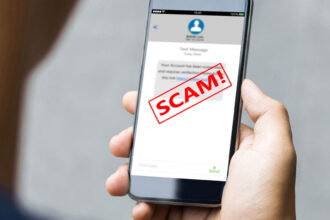A flood of consumer complaints reveals random MidweekPay loan approval texts and emails are an outright scam trying to dupe people into surrendering personal information or unknowingly taking out usurious payday loans.
MidweekPay disguises itself as a loan matching service, but utilizes deceptive phishing tactics like unsolicited messages containing convincing loan offers. Their promises of easy cash seem appealing, but it’s really a fraudulent scheme you’ll want to avoid.
MidweekPay Scam Text Messages Pretend You Applied for Loan
The sneak attacks start with texts or emails saying you’ve been approved for $1000-$5000 loans requiring just a quick verification click to receive funds. However, recipients never applied for any loan in the first place.
So how did MidweekPay get your contact information? As a payday loan lead generation service, they likely purchased data from brokers or partner lenders to blast messages randomly, hoping to catch consumers in dire financial positions.
Their personalized-sounding notifications are essentially phishing scams attempting to secure sensitive information or trick approval seekers into completing unwanted loan contracts with 363% APRs.
Identifying Mock Loan Approval Scam Red Flags
While payday lending is legal in some states, sham operators like MidweekPay utilize exploitation to profit off the disadvantaged. But several critical indicators can help sniff out fraudulent loan schemes:
- Random, unsolicited texts/emails for unapplied loans
- Vague terms without concrete company details
- Guaranteed approval regardless of credit history
- Requests for upfront “verification” payments
- Typos, grammatical errors
- No customer service contact information
- Fabricated trust ratings and reviews
If an offer raises suspicions, search “[Company] scam” online to uncover victim complaints confirming the fraud. Potentially compromised individuals should monitor credit reports and accounts for misuse.
What To Do If You Receive a Suspicious MidweekPay Message
If one of these dubious texts or emails pops up in your inbox, exercise extreme caution. Regardless whether you determine it’s deceitful or have doubts, the proper response remains unchanged:
Delete the message immediately without clicking on anything. Phone numbers/links in frauds can install harmful malware that extracts data or infects contacts. Shut down communication completely.
Quick online investigations for “MidweekPay scam” reveal consumer alerts exposing deceptive loans. Now certain it’s an illegal phishing attempt, block the sender and move on.
However, those worried they already supplied information should strongly consider credit freezes, fraud alerts, account monitoring, and reporting the incident to the FTC in case of identity theft.
Tactics Used to Trap Victims in Vicious Financial Cycle
What motivates someone to actually click on a random loan approval link from a stranger? Predatory lenders feed off exploitable weaknesses by weaponizing psychological insecurities.
MidweekPay appeals to those with poor credit or backgrounds disqualified elsewhere. Promises of quick cash loans to pay pressing medical bills, rent, and other expenses sound great when you’re financially drowning.
But hidden terms lock consumers into fine-print debt traps with balloon payments and sky-high interest rates exceeding states’ maximum legal limits. Unable to repay, victims end up buried under even more fees owed to lenders like MidweekPay.
Steps To Avoid Falling Prey to Deceitful Loan Offers like MidweekPay.com
When crises hit, avoiding irrational choices is difficult. But an emergency fraud prevention plan prepares you to evade traps when scammers call offering too-good-to-be-true fixes.
Most importantly, dismiss any business pitching itself as fast financial relief. Payday loans frequently cause lasting monetary damage compared to stability. Seek assistance from reputable non-profits and government agencies instead.
Additionally, closely guard sensitive ID details fraudsters need to commandeer your identity, like SSNs and account numbers. Never provide personal information without thoroughly authenticating requestor legitimacy first.
Lastly, limit what companies have access to contact information used by fraudsters to distribute messages. Reduce exposure to phishing vulnerabilities proactively.
Remaining cognizant of despicable tricks used prevents falling victim when predators offering predatory loans come calling. Protect yourself and finances from potential lifelong hardship.
Reporting Scams Helps Authorities Catch Criminals
Discovering you’ve been targeted by financial deceit like MidweekPay’s can leave you feeling powerless. However, reporting your experience aids officials in tracking illegal activity and halting further harm.
Begin by filing detailed fraud reports with the FTC and Consumer Financial Protection Bureau so investigators can identify incident patterns and penalize offenses.
Also document the scam through reviews on consumer sites like TrustPilot or BBB to caution others of risks. Anonymous whistleblower tips have been pivotal in confirming MidweekPay operates fraudulently.
Evidence from multiple injured parties allows robust prosecutorial cases against networks like MidweekPay and bosses orchestrating them. Reporting gives vital help defeating predatory criminal enterprises.





























